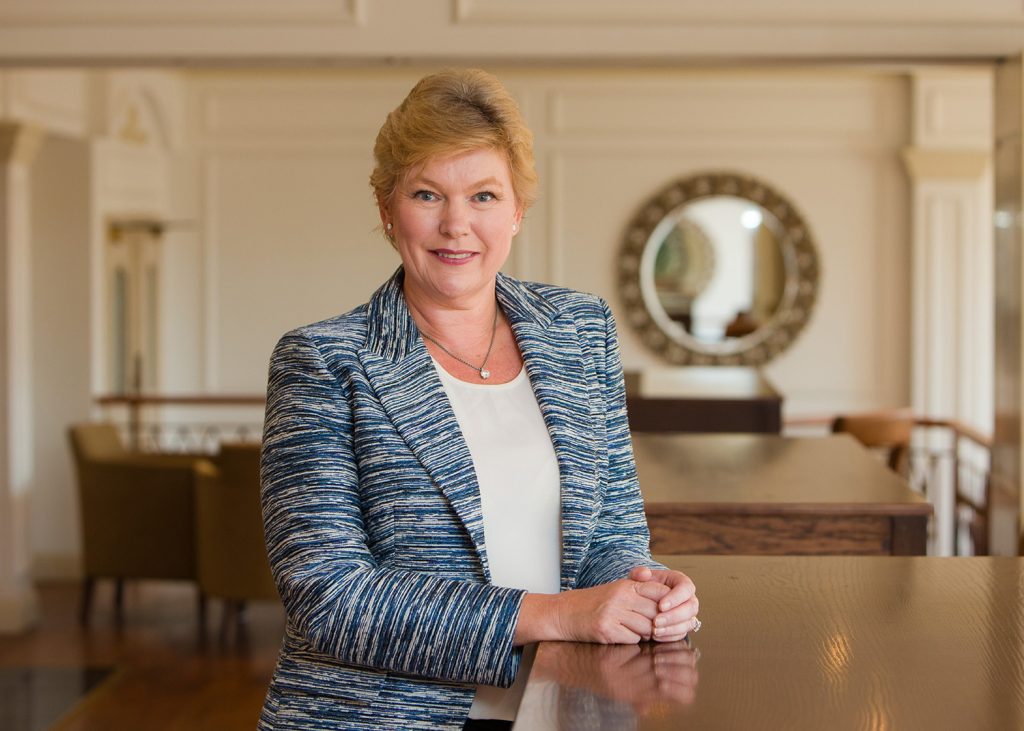
Julia Hands, Chairman & CEO Hand Picked Hotels
Interview by Michelle Chaplow
It comes as no surprise that in 2007 Julia Hands was awarded an MBE for her services to hospitality. Julia is the founder of Hand Picked Hotels, a collection of former British stately homes and manor houses that has been transformed into what is now a fine collection of unique and extraordinary hotels in beautiful locations.
- What made you want to take historic properties and give them a new lease of life as boutique historic hotels? What was your driving force?
My love of historical buildings, the English countryside, local food, and good wine is what inspired my dream to own a collection of hotels that would celebrate these passions, and invite others to share in them. It was important to me from the outset that guests could feel at home at Hand Picked, whether it was for a romantic escape, a corporate retreat, a magical wedding celebration or a chance to simply enjoy some rest and relaxation.
- Tell me about the very first property that you converted into a hotel and the challenges that you faced during the conversion.
We bought the bulk of our portfolio as operating hotels. One property that we did actually convert into a hotel was Stanbrook Abbey, near Worcester. We bought that in 2017 and just five years before that it had been a working Abbey. The people we bought it from had opened it as an event centre rather than as a hotel.
The venue could cater for large events extremely well, but it did not take individual leisure business. One of the challenges we had with that property was that the main dining room was on the second floor and the kitchen was on the ground floor. It was a very expansive footprint with lots of corridors going in different directions. One of the waiting staff had a pedometer and we discovered he had walked 12km in just one shift! This was a huge challenge, not for an events centre with large marquee on the same level, but for a hotel serving dinner for two on the second floor. We had such a high turnover of chefs and waiting staff. They could not cope with the stress and the food was not coming out hot enough. We expanded a small kitchen and took over another room to make a dining room on the ground floor and it all worked out fine. But that was quite a significant challenge for that hotel.
- Is it hard to get planning permission for an Abbey?
It can be. With this hotel, however, the local planners were fairly open-minded. There are two lifts in the hotel and they are quite discretely positioned. There is also a modern extension on the front of the hotel. There are very interesting juxta positions of new and old and in this location it really works.
- In terms of time scale how long does it take on average from the purchasing of the property, to opening the doors as a hotel?
We have always bought properties and run them as a business from day one; even Stanbrook. The fixed costs of running a hotel are so high that it is not economical to wait until you have made all the changes you want to implement. It is better to hit the ground running and operate immediately and then implement any changes once you have a really good feel for the property.
Obviously you have to explain to the guests that it is a work in progress, but most of them are very understanding.
- I read that once a year you visit all the properties, do you still do that?
Yes, for many, many years my Directors and I used to do that. We called it a roadshow, and we went around all the properties in a relatively short period of time. We made a presentation to the senior management at the hotel, explaining what our plans were for the coming year. The hotel would then make a presentation explaining what they were going to do to enhance their offering.
It was a very good way of communicating with the staff. By visiting the hotels in close succession, it gave a very good idea of the relative condition of each property, staff morale and market challenges. Of course this year has been different, [with the Coronavirus] but it is something that will resume. We would also have a tea or a lunch with as many of the team members at the hotel as were able to attend. It is a very nice way to meet and talk to people.
- Do you ever send in friends under the radar to experience your hotels and give feedback?
I don’t specifically send friends in with that purpose, but of course family and friends do stay there, often off their own bat and I do get fairly honest feedback. Of course sometimes the hotels know them so it´s not really a secret visit, but you do get some interesting takes on how the hotel is perceived and experienced by a guest.
We did have a mystery guest programme that an organisation used to run for us. They are obviously more thorough than a friend or family member, with a check list to complete along the way. It’s a good exercise.
- Where do you source the furniture for the properties?
When you buy hotels they usually come fully furnished. Where there were existing period pieces we would always incorporate them where possible, renovating them in the process or putting glass tops on tables to protect them. We definitely recognise the value of these pieces in enhancing the historical nature of the property. We source further pieces from antique sellers and auction houses.
One of our hotels, Chilston Park in Kent, was owned by the Miller antiques family, it has a whole host of interesting, quirky pieces. On a more down to earth level a significant portion of our furniture is bought new, sourced by our interior designers.
With things like banqueting tables and chairs, you have to have a standard otherwise all sorts of operational issues arise, and with beds as well, clearly. It is a blend of the two, but we do try to renovate where we can and use antique pieces.
- How important is photography to Hand Picked Hotels?
I would say extremely important: our properties are stunning, and they are wonderful photographic subjects. So we use this to our best advantage in our literature and our website. They do show off the features of the properties very well, making them very appealing. We host a lot of weddings, and each property will have a selection of beautiful photographic locations that would look fabulous in any wedding album. We do play to our strengths and recognise the power of the visual image. It is very, very important to us.
Drone footage always looks great. I am mindful that some of our images looked like the Marie Celeste with not a single person in sight, which is not great when you are trying to portray a living environment with people and interaction. Photography is an ongoing project. It is such an important part of the website: It´s what attracts people and keeps their interest.
- Do you appreciate the history that you have?
Oh, very much absolutely. The beauty of the properties, I think it bamboozles you.
- What project are you working on right now?
We are enlarging the spa at Fawsley Hall to give our guests greater amenities and more relaxation space – it is going to be beautiful and will turn that hotel into even more of a destination than it already is.
We have used the periods of shutdown to our best advantage. For example, at Nutfield Priory, which is near Reigate in Surrey, we restored the chimneys because they were in dire need of restoration and that involves a huge amount of scaffolding which is not very attractive. At the same hotel, we created a wonderful new terrace. There was an existing terrace, but it is now much more user friendly and accessible.
We have many ongoing projects for example, at Fawsley Hall we cleared the Grand Hall of all the furniture, sanded and resealed the floor there, then put the furniture back. Something that you would really struggle to do in a working hotel.
- Do think that a lot of positives have come out of the pandemic?
The hospitality industry has suffered so much and will continue to do so with these restrictions. Until we can host significant gatherings it is very difficult for whole areas of the business. I think there have been some positives but not many in this industry.
- What advice would you give to anyone dreaming of converting an historic property into a hotel or even a home.
I think you need to go into any project with your eyes open and recognise that planning and listed building issues can restrict what you want to do.You can never say I am going to do this, and this and this because it may not be possible either physically or legally.
Historic properties do have fabulous features, but they can also hide aspects that aren’t necessarily apparent when you purchase. You need to keep your eyes open and expect the unexpected, because there will be some horrors in there somewhere which can be very difficult, or at least very expensive to address. So I think as a buyer, beware and walk in with your eyes open, but it can too, obviously, be joyous!
- Do you deal with architects that specialise in historic property?
Architects have to have a sympathetic eye for the property itself and be able to produce a joined-up proposal to give to the planners. But they also need to understand the workings of a hotel and what is practical.
Event space, spa, health clubs and leisure spaces really have to be functional, with a good flow for people moving around and have a well-designed guest journey between each building.
- What legacy would you like to leave behind?
I would love the properties to continue to be cherished in the future, either as a hotel or for some other purpose. They give such joy to those who work in them and visit them. I feel passionately that they should be preserved for generations to come. They really are a beautiful aspect of our country.

Ms. Julia Hand, is a true leader with empathy in Hospitality industry and I really inspired on her achievement.